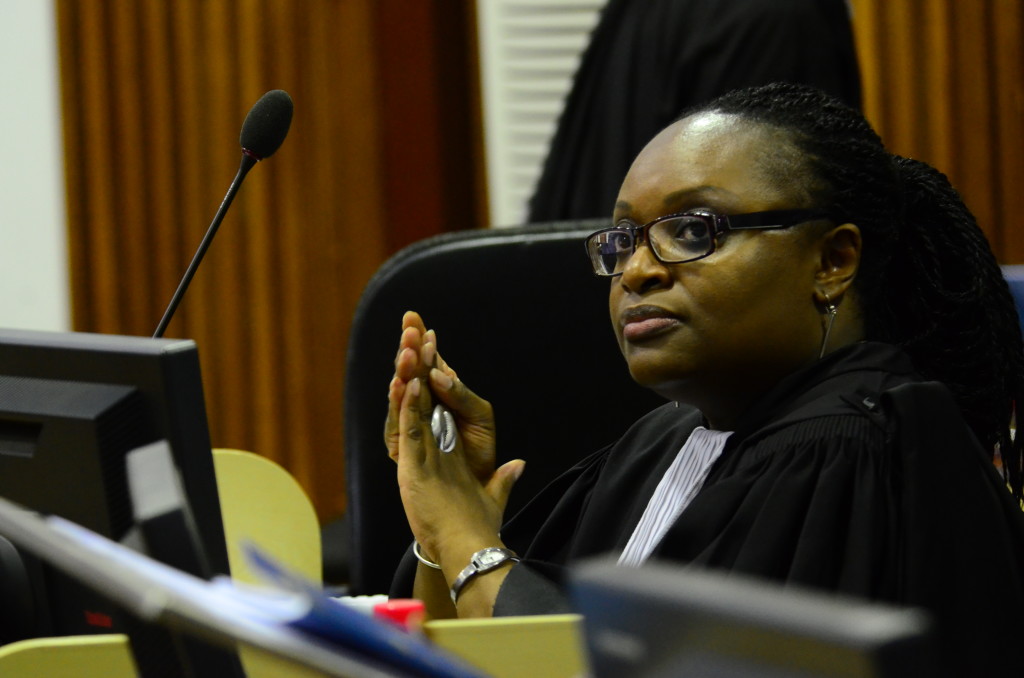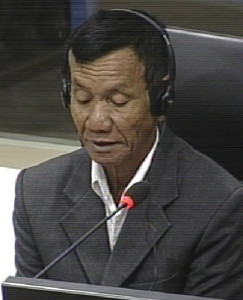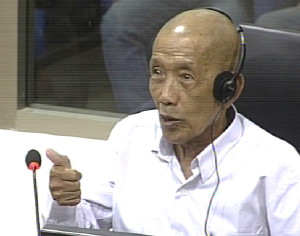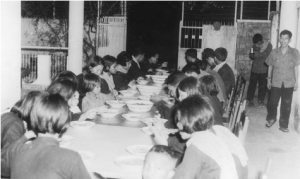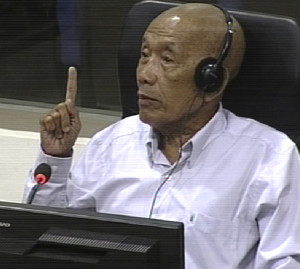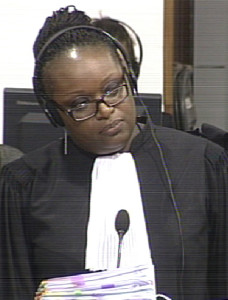‘Mr. Witness, this is not S-21’ – Testimony of Duch, Day 10
Co-Counsel for the Defense of Khieu Samphan Anta Guissé navigated through crucial subjects with witness Kaing Guek Eav, alias Duch, who is testifying in the second phase of Case 002. Though the former Chairman of S-21 Prison had provided extensive statements to the Court in the past, Ms. Guissé found different angles, relying on witness testimonies as well as on some of Duch’s own statements. This proved to be an efficient approach, at least for the first part of today’s hearing.
Co-Counsel for the Defense of Khieu Samphan Anta Guissé engaged the witness as she started her examination. Since the beginning of his testimony, the witness had not often answered questions by the negative. However, Ms. Guissé had the witness state that during the Democratic Kampuchea period, he was never a part of the Standing Committee, the Central Committee, a Zone or a District Regiment nor attended a meeting of either of these structures. His functions were limited to being Deputy Chief and later Chief of S-21. After only ten minutes of questioning, the Defense had set the tone of the day.
S-21 premises and the principle of secrecy
First, Ms. Guissé confirmed with the witness that S-21 prison left the PJ (Police Judiciaire) location for Ponhea Yat high school between April 4, 1976 and May 19, 1976. Duch added that he had been the one to choose the site of the prison for security reasons. Interrogations of prisoners were conducted outside of S-21 compound. Several testimonies, including one from Lach Mean, made mention of a zinc fence surrounding the prison, to which Duch reacted:
“The fence served two purposes: one, to prevent prisoners from escaping; two, to stop any person trespassing the area. There was no contact with the outside.”
Duch said that as head of S-21, he made sure he and his subordinates followed the principle of secrecy or he “would have been beheaded a long time ago”, quoting from a Communist Party of Kampuchea (CPK) line.
It seemed like the climate of fear in the ranks increased every year the Party was in power. Duch explained that when mass arrests started to happen, including Hun, he was “terrified” and “so exhausted” he spent a fair amount of time sleeping at home, though he estimated that about 90 percent of his work consisted in reading confessions in his own home. Even as chairman of S-21, he could never leave the compound without authorization of his immediate superior Pang, who was succeeded by Lin after Pang was arrested in 1977.
Former S-21 list-keeper Suos Thy
Ms. Guissé introduced previous statements made by witness Suos Thy, and Duch confirmed that he was in charge of the ordinary prisoners’ list but not in charge of the important ones[1]. Duch’s description of the duties of the former list-keeper also asserted that he asked incoming prisoners very basic questions: name, occupation, year of birth, and so on.
After the break, Duch confirmed that Suos Thy answered to Hor. Co-Defense Counsel Ms. Guissé asked if he recalled “any particular instructions Hor gave to Suos Thy regarding the manner Vietnamese prisoners entering S-21 had to be registered”, referring to a statement by Suos Thy to explain the grounds of her question[2]:
“Since I could not ask questions regarding the position of Vietnamese when their name was registered [Suos Thy did not speak Vietnamese], Hor instructed me to write “spies” and when they came from Kampong Thom, I was to put “fishermen”.
Duch denied this and instead recalled that the distinction was made between the Vietnamese coming into the country with arms and the ones who did not have any: the former were labelled soldiers and the latter agents. Ms. Guissé inquired if he had discussed the matter with Hor, but the witness stated that everyone was aware of this principle.
Fabricated documents were shown to prisoners to force confessions
The fabrication of documents to incite prisoners to confess was a practice usually conducted with “important” prisoners, confirmed witness Duch[3]. This method was used on former Northern Zone Commander Koy Thuon, alias Khuon, and in this case was ordered by Son Sen, Duch’s superior.
Another practice highlighted by Ms. Guissé’s inquiry to Duch was the pre-dating and post-dating of documents of some important prisoners[4]. The witness wasn’t sure how often this was done.
Duch and Hor: the fearless and the frightful
“Mr. Witness, did you play any role in the removal of Nat as head of S-21?”
“No. […] When he was arrested, I begged Son Sen to replace him with Hok […]. Son Sen scolded me for it.”
“But I would criticize Nat on a daily basis when the occasion arose. It was part of my duties since I had seen him made mistakes.”[5]
The witness was not able to provide a substantive answer to Ms. Guissé regarding the relationship between Hor and Nat. He only specified that Hor was the Chief of Special Forces, under Nat. The Co-Defense Counsel decided to sift through more previous statements by the witness in order to uncover the nature of his relationship with Hor and Nat.
The witness stated that after Hor leaked some incriminating information coming from a confession, Son Sen had given Duch orders to keep Hor from reading confessions. Ms. Guissé then tried to suggest to the witness that this may have changed their relationship but Duch said there was not any bad sentiments between them.
In order to jog Duch’s memory, the Co-Defense Counsel relied on two statements by Suos Thy:
“Mr. Witness, was Ta Nat was afraid of Duch?”
“Yes. However, Ta Nat was managing a division, but he was afraid of Duch. And Hor was very much afraid of Ta Nat.”[6]
And:
“Yes. Once again I don’t know the relation between Nat and Duch, but I can tell you Hor was very much afraid of Duch.”[7]
When confronted with these statements, Duch smiled, looking slightly amused.
“Mr. Witness, in your relations with Nat and Hor, did you get the impression that they were both afraid of you?”
“Yes, Nat was afraid of me but sometimes he dared to do things as well. […] He was daring, everybody knew that.”
The witness then added, trying the counter the depiction that he was ever a tyrant to his Comrades:
“As a leader, I had three principles regarding my subordinates: to understand them, to forgive them and to be kind to them. When Nat was arrested, Hor came to me and he was afraid of me.”
S-21 interrogations and incrimination
Duch confirmed that he had only seen Son Sen’s annotations on S-21 documents during Court proceedings, as “the S-21 documents that were sent to my superiors only contained my annotations by me, and they were never sent back to me.” [8]
Ms. Guissé turned to another topic before the break. On June 7, 2016, the witness spoke about Sim Mon, a young Cham working as a guard at S-21. Duch specified that after having committed an offence, Sim Mon was transferred to Prey Sar and after an additional mistake, he was interrogated and smashed[9].
Co-Defense Counsel Guissé tried to determine the extent as to which the incriminations were credible in light of the interrogation methods. Duch verified that when the interrogators had the prisoner, they had detailed information about him or her to find weak spots and frame their questions accordingly. However, the interrogators had summary and limited biographical data at the beginning of the interrogation sessions[10]. Duch then affirmed that he was the one who taught the interrogators how to interrogate the prisoners, but denied there was a fixed rule according to which the number of incriminations determined the chances of someone being arrested under the Democratic Kampuchea regime[11].
“The three times rule only applied in theory”, he added. “Brother Mok was implicated in 15 confessions at S-21, but he remained Deputy Chief of the Army.”
Armed conflict with Vietnam
Yesterday, Duch told Co-Defense Counsel for Nuon Chea Victor Koppe that the war between Democratic Kampuchea and Vietnam was declared on December 31, 1977. Today, Duch corrected that the exact date was 1978. Pressed for further details about when he became aware of the conflict, the witness said he knew there were clashes between the two forces in November and December 1977, up to when the Communist Party of Kampuchea declared war[12]. Even though a speech by Pol Pot mentioned the conflict in early 1978, the witness affirmed he knew about the conflict before then. He specifically recalled a January 1978 meeting during while Pol Pot spoke of the military situation and had added that “the peasants and the workers were the foundation of the Army.”
Communication between security centers – S-21 and others
Ms. Guissé moved on to the security centers that were located all over the country of Democratic Kampuchea and inquired about the Duch’s knowledge on how many there were. The witness answered he was aware of a limited number of them (two at the time) because of the lack of contact between the security centers at a horizontal level. S-21 was not in charge of any other security centers, the only communication was reporting to Committee 870. However, he was now aware there had been 196.
The witness made mention of his direct superior, Pang, who was on the S-21 compound every day to collect confessions, when Nuon Chea, also his superior, only communicated with him a few times a week. Pang was only allowed to go about the S-21 compound with Duch, and could not attend the interrogations. He would carry the confessions to Committee 870, the Central Party, in sealed envelopes.
“Mr. Witness, was Pang aware of the policy you described, that is to say when prisoners were arrested, they had to be smashed.”
“I believe he was, because it was a general principle of the CPK. […] A party’s line was not something to be discussed [whether] it was appropriate or not. Whatever was determined by the Party, it had to be implemented.”
Duch admitted that during the Democratic Kampuchea regime, he did not know everything that happened in other security centers, though he assumed the principles of the Party were applied everywhere. Co-Defense Counsel Anta Guissé’s line of questioning showed her strategical assessment of the limited knowledge the witness had over matters that went beyond S-21, in perfect consistency with her very first questions of the day.
Duch’s direct superior, Pang, incriminated
Security Chief at S-21, Chim Sang Hok, Pang’s confessions were “confusing”, Duch said shaking his head, “so he was smashed”. The witness could not remember when exactly he was killed, but recalled he was arrested a few days after the celebration of April 17, 1978[13], likely on April 20 or 21, 1978.
Referring back to the notion of “important” and “non-important” or “ordinary” prisoners tackled by Mr. Koppe yesterday, Ms. Guissé asked Duch in which category Pang was put. Duch answered that Pang was an important prisoner because he was close to the leadership, namely Brother Pahl. The witness elaborated: Ponh had been the one to interrogate him, using the “hot method” (meaning physical mistreatment and torture), and Duch did not see him or speak to him while he was detained and interrogated at S-21.
Previously, Duch stated that he attended a meeting on January 6, 1979, just days before the Vietnamese troops entered Phnom Penh. This restricted meeting bore important details, as the witness testified that it was chaired by Khieu Samphan who told them not to worry about the enemy troops. They should keep working and “stay focused on their work”, a line employed many times by witness and formed S-21 list-keeper Suos Thy in his testimony in early June.
Ms. Guissé, carefully articulating the document reference numbers, showed a quote by Duch saying there were not six but three or four people who attended the meeting[14], to which he answered:
“I stand by my previous statement. My memory was fresher then [,in 2007].”
However, then confronted with two testimonies about a seemingly similar meeting, Duch stood by his most recent statement: at this meeting, Khieu Samphan did not advise them to leave Phnom Penh for a short while to prepare an attack against the Vietnamese troops[15]. He advised them to stay and work, Duch repeated.
“Mr. Witness, following this meeting, you went back to S-21. Did you give any instructions to your subordinates following this meeting?”
“No. I only instructed interrogators about the four prisoners from Y8 [that were to be smashed].”
Duch then described how he saw Ieng Sary in his car from a distance: “he had a stern expression”.
“After January 3, I was tired and hopeless. After the arrests of [my comrades], I was thinking that one day, it would be my turn.”
Then questioned by Ms. Guissé, the witness was sure that the last executions at S-21 took place in January 1979 and not in December 1978: “The instruction was to kill all the prisoners. […] The instruction was made by Nuon”. Ms. Guissé insisted that several witnesses were not aware of it.[16]
“To my recollection, all of them were killed by January, because there were many prisoners, it was difficult to smash all of them you know, in just three days”.
Duch disavows his own statement
The following bone of contention marked the end of the day. Co-Defense Counsel Anta Guissé started off by referring to a 1999 statement Duch made in front of the military tribunal: “Khieu Samphan and Ieng Sary, until this date we have never met, not even once” [17], which the witness denied firmly. Ms. Guissé pointed out that when he was confronted with one of his 2007 statement today, he chose to stand by it, arguing it was closer to the events in question.
“Your memory would have been even fresher in 1999, Mr. Witness.”
“[…] the meeting between me and Brother Hem [Khieu Samphan] is engraved in my mind. I will never forgot these two events in my life.”
The witness became more agitated, stirring on his chair and accentuating his brisk gestures. Waving his eternally accusatory finger, Duch blamed Ms. Guissé:
“You only read part of the document and ignored the other parts.”
The Co-Defense lawyer replied that Duch had put his finger prints and signature on that 1999 statement in front of the military Tribunal. “This document is suspicious”, shouted the witness. Ms. Guissé, who had remained calm all day long, then asked him:
“Mr. Witness, why do you say it is suspicious? It is because it does not at all refer to the meeting or because you put your fingerprints and signature on a document that [did not provide full details]?
“Please Counsel, give me the full written records of the interview.”
“Mr. Witness, we are not at S-21, where you can order people to do whatever you would like. This is an examination.”
Interjecting in a tense moment, President and Judge of the Chamber Nil Nonn called Co-Defense Counsel Guissé to order, saying that the witness had simply made a request.
Ms. Guissé concluded her interrogation for the day, making one last reference to the instructions given by Khieu Samphan during the meeting mentioned above. Duch maintained his position. The President adjourned the hearing, which will continue tomorrow, June 23, 2016 at 9am.
Featured image: Kaing Guek Eav, alias Duch, in 2013, holding a picture of himself during the Khmer Rouge period. (Documentation Center of Cambodia)
[1] E3/10521.
[2] See Shedding Light on Lists of S-21 Prisoners: the Facts Between the Lines, The Cambodia Tribunal Monitor, June 3, 2016.
[3] 14/06/2016, at 13h38.
27/03/2012, E1/54.1, at 11h10. “this was an invention, and it was a tactic to extract confessions to prisoners. We never reported these documents to our superiors”.
[4] E3/893.
[5] E1/52.1, at 15h49.
[6] E3/9320, at 00052028 (KH), 00337982 (EN), 002820526 (FR).
[7] E3/7466.
[8] E1/59.1.
[9] E3/1822, at 0078508 (photograph of Sim Mon).
[10] E3/10607, at Questions 18&19. “a biography included a name, a year and place of birth, education, affiliation, personal occupation, occupation of parents and siblings.”
[11] 3/04/2012, E1/58.1.
20/06/2016, 15h38. “in this regard, accusing a person once did not suffice to arrest him/her, [Pol Pot referred to 10 times].”
[12] E3/4604, at 00520342 (FR), 00519832 (EN), 00064710 (KH).
[13] E3/1596, at 00758366 (FR), 00013354 (EN), 00753743 (KH).
[14] E3/456, at 00198872 (KH), 0198889 (FR), 0019880 (EN).
[15] Sim Hao E1/207.2, 13/06/2013 and Ruos Soy E1/184.1. 25/04/2013.
E3/452, 00147928 (FR), 00146551 (KH), 00147565 (EN). E3/5030.
[16] E3/5769, at 00166574 (FR), 00166591 (KH), 00166564 (EN). Suos Thy, 3/06/2016. “In regard to the list of outgoing prisoners who may have been executed. To my knowledge this 31/12/1978 list was the last list of prisoners that were to be executed.”
[17] E3/530, at 00095691 (KH), 00329135 (EN), 00327365 (FR).

